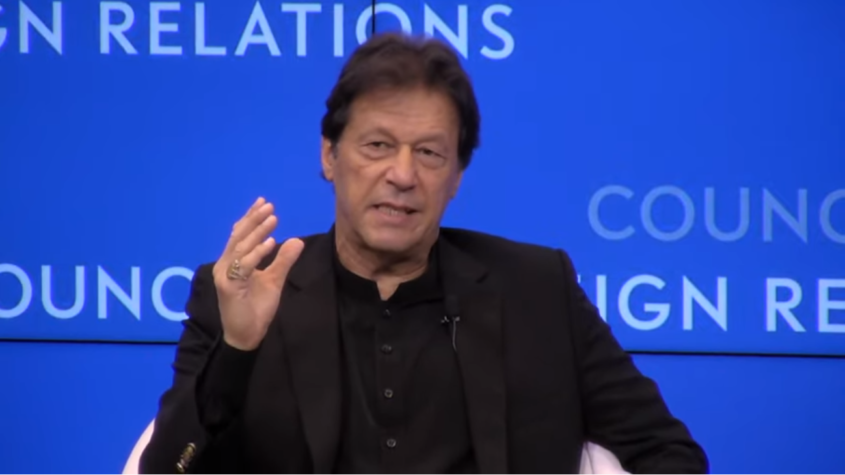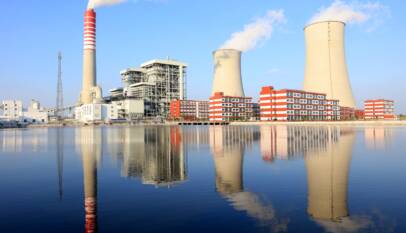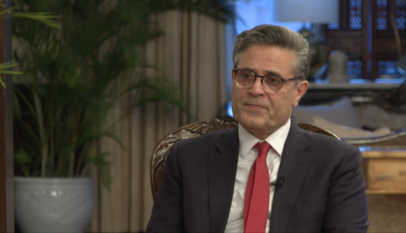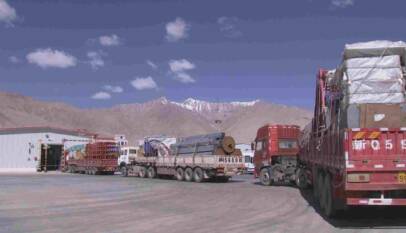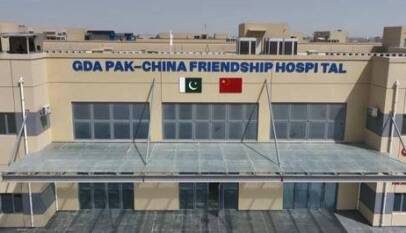PM Khan Lauds China’s Unflinching Support in Tough Times at Think Tank in US.
Prime Minister of Pakistan, Imran Khan is on his second visit to the United States. Khan gave an interview to the Richard N. Haass, president of Council on Foreign Relations (CFR). In answering a question on Pakistan’s fragile economic situation and dependency on IMF, Khan said when he formed the incumbent government, Pakistan faced one of the biggest fiscal deficit which his government has been able to cut for more than 70 percent which has been possible only with the China’s support. Khan stated that China became Pakistan’s savior when we were on the brink of default. PM further said that Pakistan has now chance to host relocation of Chinese industries and obtain modern technology. Khan acknowledged China’s role in socio-economic uplift of Pakistan.
Prime Minister Imran Khan spoke at an event at the Council on Foreign Relations (CFR) think tank in New York on Monday.
The premier was in a conversation with Richard N. Haass, the president of CFR. He discussed the current state of US-Pakistan relations, recent developments in occupied Kashmir, and Pakistan’s relationship with India, Afghanistan, and other neighbouring countries.
The interview started with Prime Minister Imran saying that his background as a cricket star had taught him the invaluable lesson of “how to struggle” and deal with setbacks.
Asked why Pakistan repeatedly has to turn to the International Monetary Fund (IMF) for financial assistance, the premier said: “The moment you have a deficit, whether it is current account or fiscal deficit, means you are not managing your economy properly […] This inability of successive governments to manage our economy is why we keep lining up with the IMF.”
He said his government had inherited “the biggest current account deficit” in Pakistan’s history and “so the first year has been a real struggle.”
“I am really proud to say that we have cut down this deficit almost by 70 per cent. We now have an economy which is heading in the right direction,” he said.
He said when his party came into power last year, Pakistan found itself to be in probably “the worst economic situation” and it was China that came to the country’s help “when we were at the rock bottom”.
“We were staring at a default,” the prime minister said, adding that China along with Saudi Arabia and the UAE had provided funds to beef up Pakistan’s foreign exchange reserves.
He said the country now has the opportunity to get Chinese industries to relocate to Pakistan and bring in technology. “China has given us a great opportunity to lift ourselves up from where we are right now,” he added.
US-Pakistan relations, Afghan war
Answering a question regarding former US defence secretary James Mattis’ remark that he considered Pakistan to be “the most dangerous” among all countries he had dealt with, Prime Minister Imran said: “I do not think James Mattis fully understands why Pakistan became radicalised.
“In the 1980s, when the Soviets invaded Afghanistan, Pakistan, helped by the United States, organised the resistance to the Soviets. And the resistance was organised by the Pakistani ISI (Inter-Services Intelligence) training these militants who were invited from all over the Muslim world to do jihad against the Soviet Union.
“And so we created these militant groups to fight the Soviets. […] Jihadis were heroes then. Come 1989, Soviets leave Afghanistan, the US packs up and leaves Afghanistan […] and we were left with these groups.
“Then comes 9/11, and Pakistan again joins the US in the war on terror and now we are required to go after these groups as terrorists. They were indoctrinated that fighting foreign occupation in jihad but now when the US arrived in Afghanistan, it was supposed to be terrorism.
“So Pakistan took a real battering in this,” he said, adding that Pakistan should have stayed neutral in the conflict.
“Pakistan by joining the US after 9/11 committed one of the biggest blunders,” he said, noting that 70,000 Pakistanis had died in the ensuing violence and the country lost hundreds of billions in economy. “I think the Pakistani government should not have pledged what they could not deliver.”
The premier said he had always stressed that there could be no military solution in Afghanistan.
To a question regarding insurgents allegedly going from Pakistan to carry out attacks in Afghanistan, Prime Minister Imran said there are some 2.7 million Afghan refugees in Pakistan and there is no actual border in the tribal region. “How do we know who is coming in and going out?” he questioned, saying Pakistan could not be expected to completely shut the border when refugees in such large numbers live there.
“I do not think it’s because of Pakistan that the US has not able to succeed in Afghanistan, simply because there is a history behind it; it was never going to happen,” he said.
The premier said it was “painful” for Pakistan that the peace deal that was about to be signed between the US and Afghan Taliban had collapsed. He also said his government found out about the talks breaking down through newspapers, and that the US “should have at least discussed” with Pakistan before calling off the talks.
He said he would emphasise in his meeting with US President Donald Trump that there will not be a military solution to the Afghan conflict. “For 19 years if you have not been able to succeed, you are not going to be able to succeed in another 19 years,” he added.
‘Every policy backed by army’
Answering a question regarding the state of civil-military relations in Pakistan, Prime Minister Imran said the country’s army moved in because it was given space “due to a lack of moral authority because of corrupt governments”.
He said all of his policies undertaken since he took office were part of his party’s manifesto. “Every policy of my government, which was [to establish] peace with our neighbours, has been backed by the Pakistan Army,” he added.
He said it was for the first time during his government that the army took a cut in the military spending.
Pakistan-India ties
On the future of Pakistan’s troubled relationship with India, Prime Minister Imran said he had approached Indian Prime Minister Narendra Modi at the start of his term to have a “reset” in bilateral ties and base the relationship on mutual trust.
He said following the Pulwama attack, he had offered to take action against any indication by India that a Pakistani was involved in the deadly bombing. In response, however, “they (India) bombed us,” he said.
Prime Minister Imran said his government waited to resume talks until after the Indian elections were over but then it found that “India is pushing us in the blacklist of FATF (Financial Action Task Force) to bankrupt us.
“That’s when we started thinking there is some sort of an agenda going on,” he said, recalling that subsequently India revoked occupied Kashmir’s special autonomy on August 5.
He added that through its unilateral actions, New Delhi had cast aside the UN Security Council resolutions, the Simla accord and its own constitution.
“That’s when I said this is an RSS agenda which they are following,” the premier said of the Indian government. “I worry now where the two countries are.”
He said when two nuclear-armed countries engage in conflict, “anything can happen in such situations”. He said he would ask the UN to play its role because this is why it had come into being.
Referring to occupied Kashmir, he said eight million of its residents have been shut inside their homes for 50 days now. “How can we speak to India [in such a situation]?” he asked, saying the least he expects the international community to do is to ask India to lift the curfew in Kashmir.
Women, minority rights
Speaking about his government’s efforts to protect women’s and human rights in the country, the prime minister said they have taken steps to protect minorities and their places of worship.
“My concept of Pakistan is where our minorities are equal citizens and the rights of women and weaker sections are protected,” he said, adding that his government had come up with the “biggest-ever poverty alleviation programme” in the country’s history despite fiscal constraints.
He said the country required special packages and programmes, and not new laws, to support women and the weaker social segments.
In response to a question regarding minorities’ rights, Prime Minister Imran said there is only one Islam. “There is no such thing as moderate Islam or radical Islam,” he emphasised, adding that Islam accords complete rights to minorities.
Prime Minister Imran is on a seven-day visit to the United States to attend the 74th session of the United Nations General Assembly opening on September 24.
Gwadar Pak-China Friendship Hospital pioneers laser-assisted bladder stone surgery
China-aided Gwadar Pak-China Friendship Hospital has debuted in conducting an operation to…



